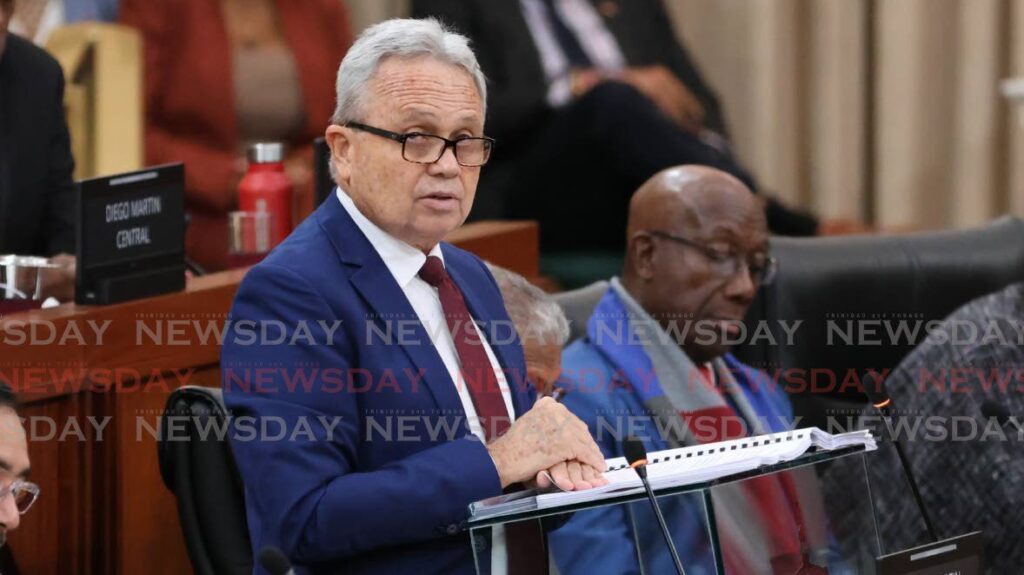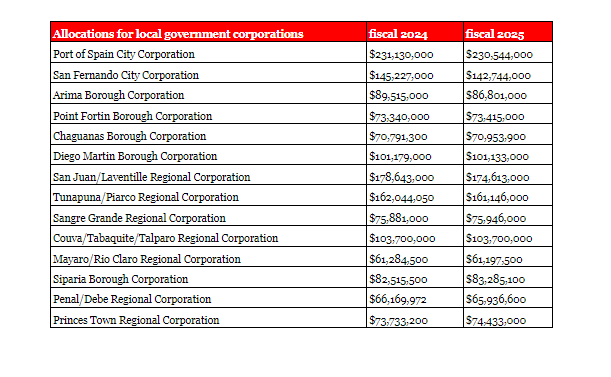Increases, decreases for local government corporations

THERE were increases and decreases in the allocations for local government corporations for fiscal 2025.
There was also a decrease over the same period in the allocation for the Community-Based Environmental Protection and Enhancement Programme (Cepep).
This information is contained in the Draft Estimates for Recurrent Expenditure for Financial Year 2025, which was laid in the House of Representatives on September 30 when Finance Minister Colm Imbert presented the 2024/2025 budget.
The document showed increases for the Point Fortin Borough, Sangre Grande Regional, Siparia Borough, Chaguanas Borough and Princes Town Regional Corporations from fiscal 2024 to 2025.
Over the same period, there were decreases in allocations for the Port of Spain City, San Fernando City, Arima Borough, Diego Martin Borough, San Juan/Laventille Regional, Tunapuna/Piarco Regional, Mayaro/Rio Claro Regional and Penal/Debe Regional Corporations.
There was no change in the allocation for the Couva/Tabaquite/Talparo/Regional Corporation from fiscal 2024 to 2025.
In his budget presentation, Imbert announced a total allocation of $1.771 billion for the Rural Development and Local Government Ministry for fiscal 2025.
Cepep, which falls under the ministry, received a decrease in its allocation from $505,500,000 in fiscal 2024 to $466,000,000 in fiscal 2025.
At a news conference in Chaguanas on September 20, St Augustine MP Khadijah Ameen said approximately $43.6 million is being taken away from all 14 local government corporations and will be used for the PNM’s benefit.
A September 2 memo from the Finance Ministry’s budget division to the permanent secretary of the Rural Development and Local Government Ministry, said Imbert had approved the transfer of $43.6 million from one head of expenditure under the ministry to another.
The latter included Cepep and the National Reafforestation and Watershed Rehabilitation Programme under the Rural Development Corporation (RDC).
The respective sums allocated to these entities were $36,622,300 and $7,000,000 – a total of $43,622,300.
The memo showed the reallocation of money from 12 corporations. The San Fernando City Corporation and the Point Fortin Borough Corporation, which are controlled by the PNM, were excluded.
The memo showed the PNM-controlled Port of Spain City, Arima Borough, Diego Martin Borough and San Juan/Laventille Corporations all had monies reallocated from them.
The other eight corporations from which money was reallocated are controlled by the UNC.
In response, Rural Development and Local Government Minister Faris Al-Rawi rejected Ameen’s claims.
“At the budget and in particular in the standing finance committee, an account of the financial performance of the corporations will feature and will demonstrate the reasons for virements and transfers.
“By now, one would think that Miss Ameen would know that every year there is also a specific parliamentary sitting to close the accounts of the country apart from the budget cycle and that an FOIA (Freedom of Information Act request) is for information whilst these sittings provide reasons.”
Ameen said the UNC will file an FOIA request to find out what the $43.6 million will be used for. But she could not say when this request would be filed.
She gave no indication when this would be done.
Al-Rawi said during the budget debate, there will be an analysis of the impact of the public procurement law, which has been in effect for a year, and particularly its impact with respect to expenditure.
“These discussions will assist in understanding that all Miss Ameen’s drama is due to sheer and simple misunderstanding if not ignorance.”
The budget debate begins in the House on October 4 at 10 am with Opposition Leader Kamla Persad-Bissessar’s response to the budget.
The debate in the House could last for about one week before its Standing Finance Committee deliberates on the budget for the mandatory five-day period under the House’s standing orders.
Once passed, the budget will be debated in the Senate. Under its standing orders, senators cannot vote on the budget as they are forbidden to vote on money bills.


Comments
"Increases, decreases for local government corporations"